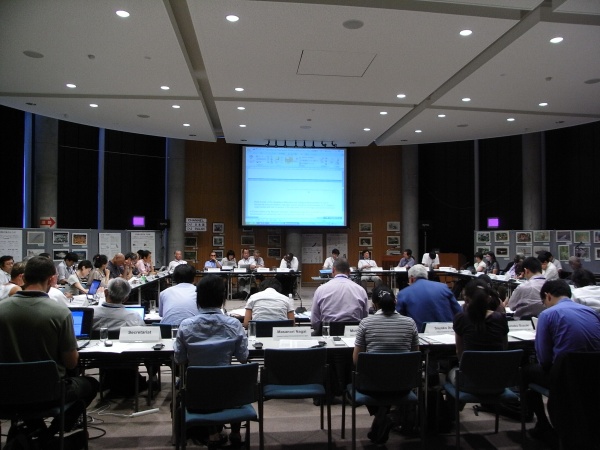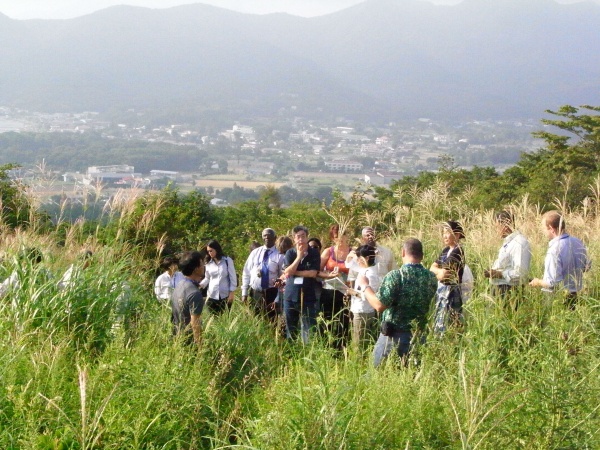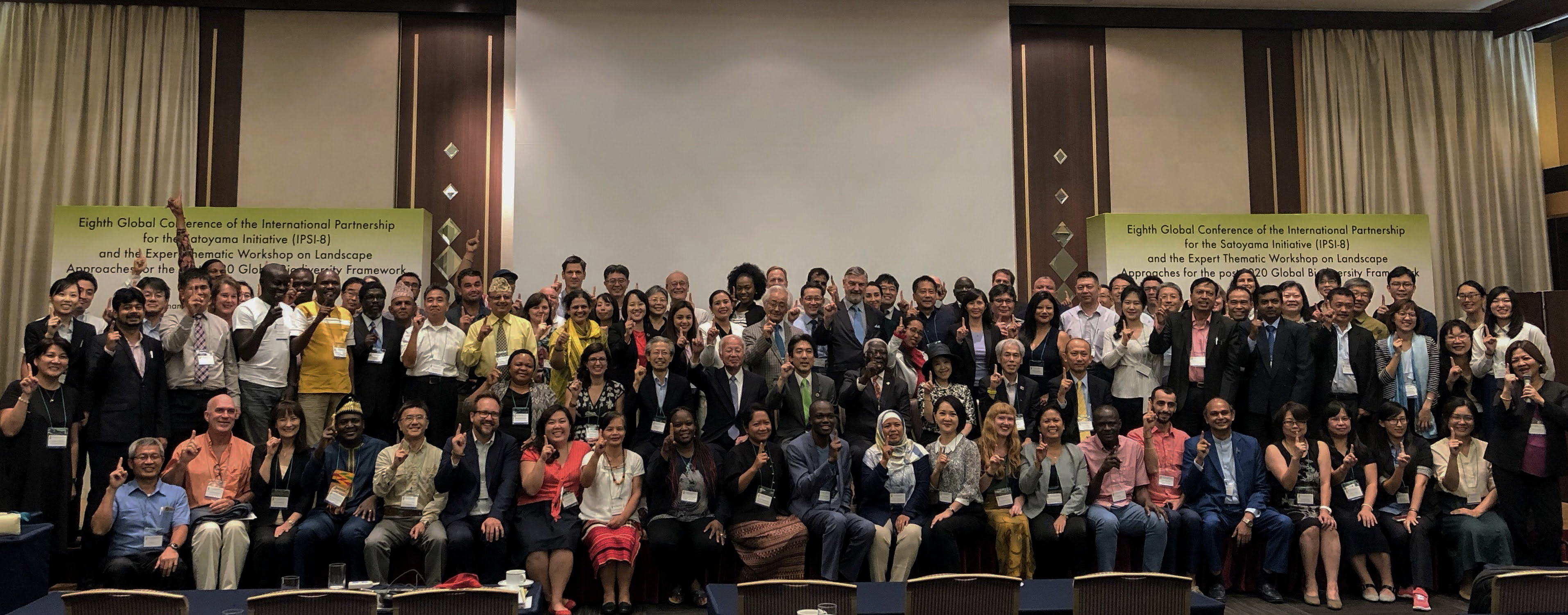The Preparatory Meeting on the International Partnership for the Satoyama Initiative (IPSI) , entitled “Working together for promoting socio-ecological production landscapes,” was held on 23-24 August 2010 at the Yamanashi Institute of Environmental Science, Yamanashi, Japan. The meeting was held in preparation of the official launch of the International Partnership (or IPSI) at the 10th meeting of the Conference of the Parties to the Convention on Biological Diversity (CBD-COP10) in Nagoya, Japan, this October.
This meeting was organised by the Ministry of the Environment of Japan (MoEJ) and the United Nations University Institute of Advanced Studies (UNU-IAS), and co-organised by the Secretariat of the Convention on Biological Diversity (SCBD). The meeting was made open to the public through advance registration.
The objectives of the Meeting were to:
1) Discuss operational modalities of the International Partnership for the Satoyama Initiative (IPSI) and its activities,
2) Plan the IPSI launch at CBD COP 10, and
3) Consider draft CBD COP decisions relevant to the Satoyama Initiative.
Programme of the Meeting
[Monday, 23 August 2010]
Session 1: Operational Modalities of IPSI
Agenda item 1: Consideration of Draft Operational Framework
Agenda item 2: IPSI Collaborative Activities
[Tuesday, 24 August]
Session 2: Strategy towards and after COP 10
Agenda item 3: Draft IPSI Launch Programme at COP 10
Agenda item 4: Brainstorm and Draft the CBD COP Decisions Relevant to the Satoyama Initiative
Outline and result of discussions
[23 August: Operational Modalities of IPSI]
Agenda Item 1: Consideration of Draft Operational Framework
UNU-IAS presented the draft IPSI Operational Framework, which broadly covers the programme, institutional framework, and IPSI operational modalities. The participants raised several points during the discussion to refine and finalise the text for further clarity and to ensure operational effectiveness of IPSI.
Discussions included the importance and the need for (i) indigenous and community participation in IPSI, (ii) language and editorial support for non-English based communities, particularly regarding the case study submission, (iii) further consideration of the Partnership Assembly, (iv) securing a democratic scheme and the continuity of the Steering Committee, (v) collaboration with other biodiversity-related programmes under the Convention on Biological Diversity, and (vi) consideration of the IPSI finance mechanism. There was also a general consensus favouring the continuity of UNU-IAS as the IPSI Secretariat in view of its contribution thus far.
Agenda item 2: IPSI Collaborative Activities
UNU-IAS presented the IPSI framework for collaborative activities and other activities related to IPSI; participants presented their activities, which generated ideas for concrete collaborative activities. Participants discussed the effective development of IPSI activities and concurred on the importance of (i) multi-stakeholder participatory and community-driven approaches for effective community based natural resource management, (ii) the integration of traditional practices and modern science for innovative approaches, (iii) capacity building for natural resource management practice, and (iv) learning lessons and promoting synergies by collaborating with activities such as the community-led GEF Small Grant Programme implemented by UNDP and the Critical Ecosystem Partnership Fund.
[24 August: Strategy towards and after COP 10]
Agenda item 3: Draft IPSI Launch Programme at COP 10
Based on the Draft Programme for the IPSI Launch Ceremony and the Inception Meeting, participants discussed the strategic focus of the IPSI launch side event and procedural requirements at CBD COP 10.
Agenda item 4: Brainstorm and Draft the CBD COP Decisions Relevant to the Satoyama Initiative
Participants discussed issues related to the draft text of the COP 10 decision on IPSI to be presented at COP 10. Discussions continued to emphasise IPSI’s value as a useful framework for sustainable resource management and community empowerment. The importance of providing information and undertaking dialogue particularly with stakeholders who are not adequately informed about IPSI was also stressed during the discussion.
The meeting documents of this event, discussion papers, other relevant information such as the programme, presentations, and information papers as well as Co-Chair Summary, Operational Framework and Supplementary Document to the Operational Framework are now available for download

Meeting in progress

Excursion
Programme
Summary Records
Co-chairs Summary
Participants
List of Participants
Output
[Decision Paper] Operational Framework
[Decision Paper] Supplementary Document to the Operational Framework
Discussion Papers
Agenda item 1: Draft Operational Framework
Agenda item 2: IPSI Collaborative Activities
Agenda item 3: Draft IPSI Launch Programme at COP 10
Agenda item 4: Brainstorm and Draft the CBD COP Decisions Relevant to the Satoyama Initiative
Information Documents
Information Paper: UNU-IAS Proposal of Activities under Cluster 1: Knowledge Facilitation
United Nations University Institute of Advanced Studies (UNU-IAS) download
Information Paper: Agricultural Biodiversity Conservation and Man and Biosphere Reserves
Bioversity International download
Information Paper: Contributed Brief for the Discussion on Collaborative Activities of the IPSI
EcoAgriculture Partners download
Information Paper: Knowledge Facilitation for the Satoyama Initiative
United Nations Environment Programme World Conservation Monitoring Centre (UNEP-WCMC) download
Information Paper: Activity proposal Satoyama Initiative
International Network for Bamboo and Rattan (INBAR) download
Presentations
Introduction of draft operational framework
Fumiko Nakao, Fellow, United Nations University Institute of Advanced Studies (UNU-IAS) download
Collaborative Activities of the International Partnership for the Satoyama Initiative
Fumiko Nakao, Fellow, United Nations University Institute of Advanced Studies (UNU-IAS) download
UNU-IAS and International Satoyama Initiative
Govindan Parayil, Director, UNU-IAS / Vice-Rector, UNU download
Proposed Activities for Knowledge Facilitation and Policy Research
Kazuhiko Takeuchi, Vice-Rector, United Nations University/ Director, UNU Institute of Sustainability and Peace download
UNEP’s Potential Contribution
Alphonse Kambu, Programme Officer, Biodiversity and land Law and Governance Unit, Division of Environmental Law and Conventions (DELC), United Nations Environment Programme (UNEP) download
Conserving Biodiversity in Agrarian and Natural Landscapes: Developing and applying global indicators of social and ecological integrity and well-being of mosaic landscapes rich in biodiversity
Pablo Eyzaguirre, Senior Scientist, Bioversity International download
Biodiversity, Human Security and Regional Development: Partnership with the Satoyama Initiative
Wakako Ichikawa, Consultant, United Nations Centre for Regional Development (UNCRD) download
GEF Mainstreaming Biodiversity into Production Landscapes/Seascapes and Sectors
Yoko Watanabe, Program Manager and Senior Biodiversity Specialist, Secretariat of the Global Environmental Facility (GEF) download
A community driven approach to socio-ecological production landscapes Management
Fumiko Fukuoka, Deputy Global Manager, GEF-Small Grants Programme (Implemented by UNDP) download
Providing support for on-the-ground projects and activities to maintain, rebuild and revitalize socio-ecological production landscapes
John Watkin, Grant Director, The Critical Ecosystem Partnership Fund download
Activities of CI: Science, Demonstration, Amplification
Yasushi Hibi, Vice president for Asia Policy and managing Director, Japan Program, Conservation International download



